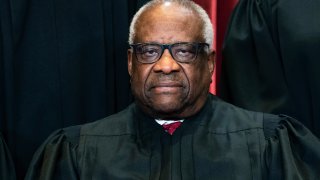
The Supreme Court opened its new term Monday with a case about prison terms for drug dealers and rejections of hundreds of appeals, including one from an attorney who pushed a plan to keep former President Donald Trump in power.
The court turned away attorney John Eastman's effort to have a lower-court ruling thrown out that said Eastman and Trump had “more likely than not” committed a crime by trying to keep Congress from certifying President Joe Biden's victory in the 2020 election.
Justice Clarence Thomas, who once employed Eastman as a law clerk, did not take part in the court's consideration of Eastman's appeal.
The only case argued Monday concerns the meaning of the word “and” in a federal law dealing with prison terms for low-level drug dealers. The length of thousands of sentences a year is at stake.
Get top local stories in Connecticut delivered to you every morning. Sign up for NBC Connecticut's News Headlines newsletter.
“I think this is a very hard case,” Justice Amy Coney Barrett said during 90 minutes of arguments that did not suggest how the court might rule.
The term is shaping up as an important one for social media as the court continues to grapple with applying older laws and rulings to the digital age.
Several cases also confront the court with the continuing push by conservatives to constrict federal regulatory agencies. On Tuesday, the court will hear a challenge that could disrupt the Consumer Financial Protection Bureau.
U.S. & World
The court also is dealing with the fallout from major rulings a year ago that overturned Roe v. Wade and expanded gun rights. A gun case will be argued in November. Limits on mifepristone, a drug used in the most common method of abortion, could be before the court by spring.
Among the bigger unknowns is whether any disputes will reach the court involving the prosecution of Trump or efforts to keep the Republican off the 2024 ballot because of the Constitution’s insurrection clause.
Apart from cases, the justices are discussing a first-ever code of conduct, though disagreements remain, Justice Elena Kagan said recently.
The push to codify ethical standards for the justices stems from a series of stories questioning some of their practices. Many of those stories focused on Thomas and his failure to disclose travel and other financial ties with wealthy conservative donors, including Harlan Crow and the Koch brothers. But Justices Samuel Alito and Sonia Sotomayor also have been under scrutiny.
On Monday, Thomas did not explain his decision to stay out of Eastman's case, which involved emails that Eastman was trying to keep from the House committee that investigated the Jan. 6, 2021 attack on the Capitol.
Some of those emails, since made public, are between Eastman and another lawyer, Kenneth Chesebro, in which they mention Thomas as their best hope to get the Supreme Court to intervene in the election outcome in a case from Georgia.
Trump, Eastman and Chesebro are among 19 people who have been indicted in Fulton County, Georgia, for their efforts to overturn the 2020 election.
Life at the court has more or less returned to its pre-COVID-19 normal over the past two years, though arguments last much longer than they used to and Sotomayor, who has diabetes, continues to wear a mask on the bench . One other change that resulted from the coronavirus pandemic remains: The court is livestreaming audio of all its arguments. Cameras remain forbidden.



